Key takeaways:
- Understanding the patchwork of cannabis laws requires constant vigilance and access to local regulations, as they can differ significantly between cities and states.
- Maintaining organized documentation of cannabis-related paperwork is crucial for compliance and ease of access, helping to avoid legal pitfalls and missed deadlines.
- Staying informed about legal changes and seeking professional legal advice enhances understanding and ensures better navigation of the evolving cannabis landscape.
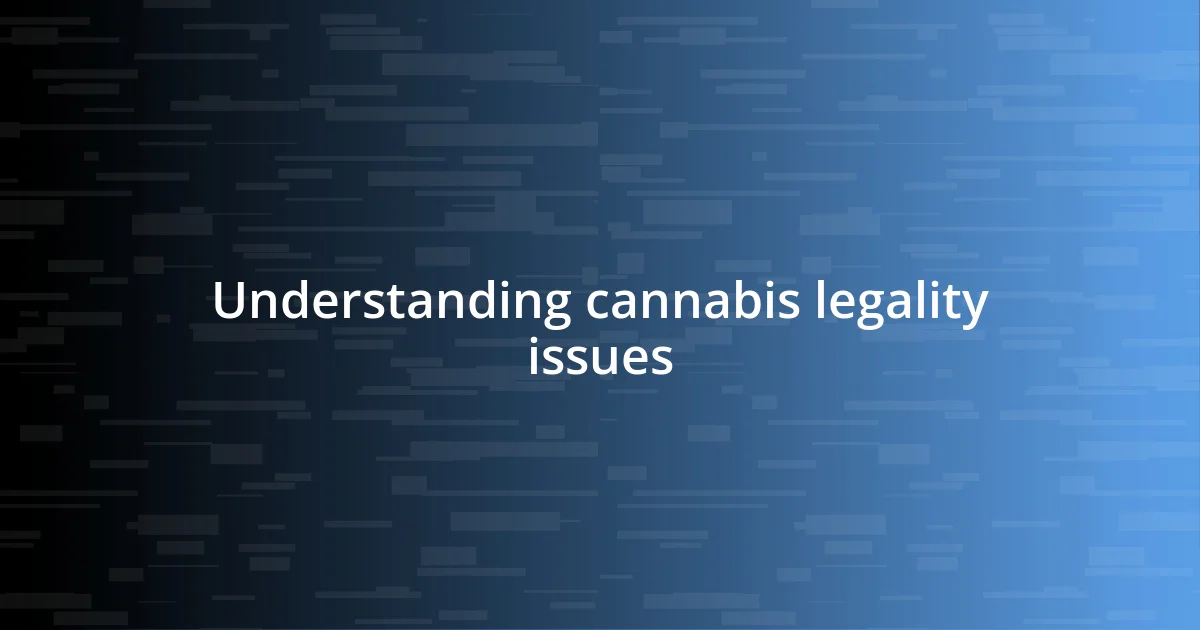
Understanding cannabis legality issues
Navigating the world of cannabis legality can often feel like walking through a maze with ever-shifting walls. I remember feeling overwhelmed when I first started researching where cannabis was legal and where it wasn’t; the patchwork of state laws always left me wondering, “Am I following the right path?” Discovering that laws could change from one city to another really highlighted the need for vigilance and constant updating.
One aspect that deeply struck me was how stigma and fear have historically shadowed the cannabis conversation. For many years, I hesitated to openly discuss my experiences, worried about the potential repercussions due to the lingering misconceptions around cannabis. This fear made it tough to foster a genuine dialogue about its legality and potential uses. Have you ever felt this sense of apprehension in a conversation about cannabis?
When I finally decided to dive deeper into legal resources and community forums, I found an array of voices sharing tips and strategies. It was refreshing to realize that I wasn’t alone in this journey. Hearing others share their knowledge and experiences made me think about the power of collective wisdom in demystifying cannabis legality. Have you tapped into these communities, too?
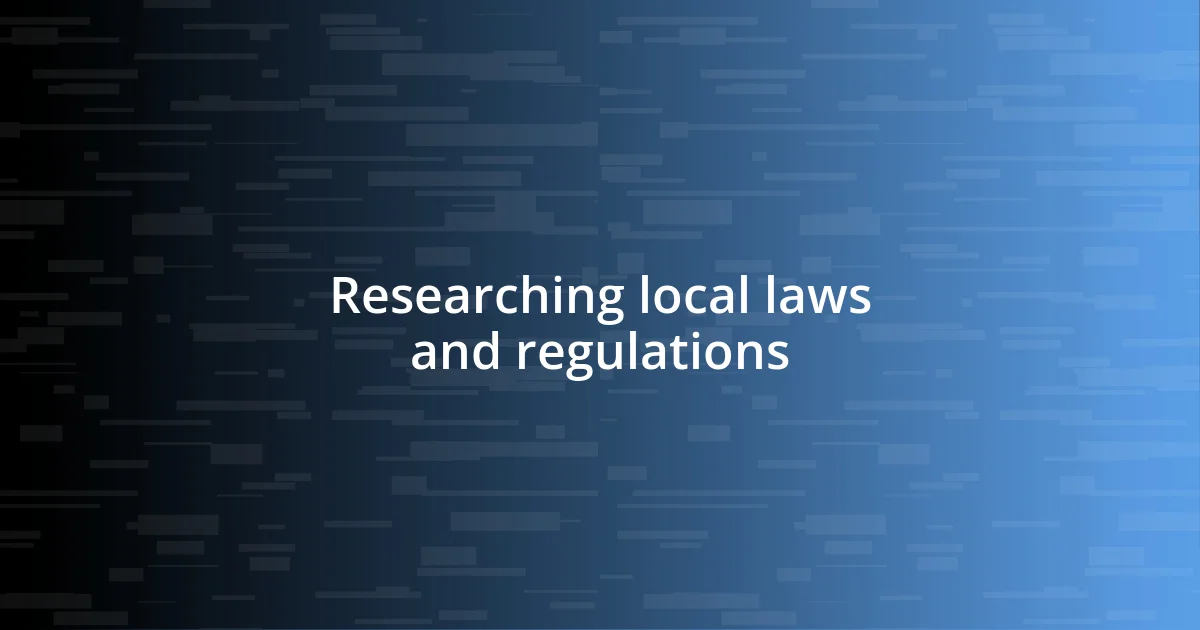
Researching local laws and regulations
One of the first steps I took while researching local cannabis laws was to consult state-specific government websites. These sites often provide the most accurate and up-to-date information, but I found them to sometimes be dense and hard to navigate. It was frustrating at first to sift through legal jargon, but I learned to look for user-friendly resources that broke down the regulations into simpler terms. Have you ever encountered information that felt like it was written in another language?
Additionally, I discovered that local municipalities can have their own regulations, separate from state laws. This was particularly eye-opening for me. I remember a time when I planned a trip to a neighboring city, only to realize that their cannabis laws were vastly different from those of my home city. It made me realize just how crucial it is to seek out localized resources to avoid potential legal pitfalls.
Connecting with local advocacy groups and online forums proved to be invaluable in my research journey. These community-led platforms provided real-life insights and experiences that often painted a clearer picture than the official texts. I vividly recall a blog discussion where someone shared their unexpected encounter with law enforcement in a region with strict cannabis rules. This helped me understand not just the laws, but the human experience behind them, highlighting the importance of staying informed.
| Resource Type | Benefits |
|---|---|
| Official Government Websites | Accurate, up-to-date information |
| Local Advocacy Groups | Real-life insights and personal experiences |
| Online Forums | Community support and shared strategies |
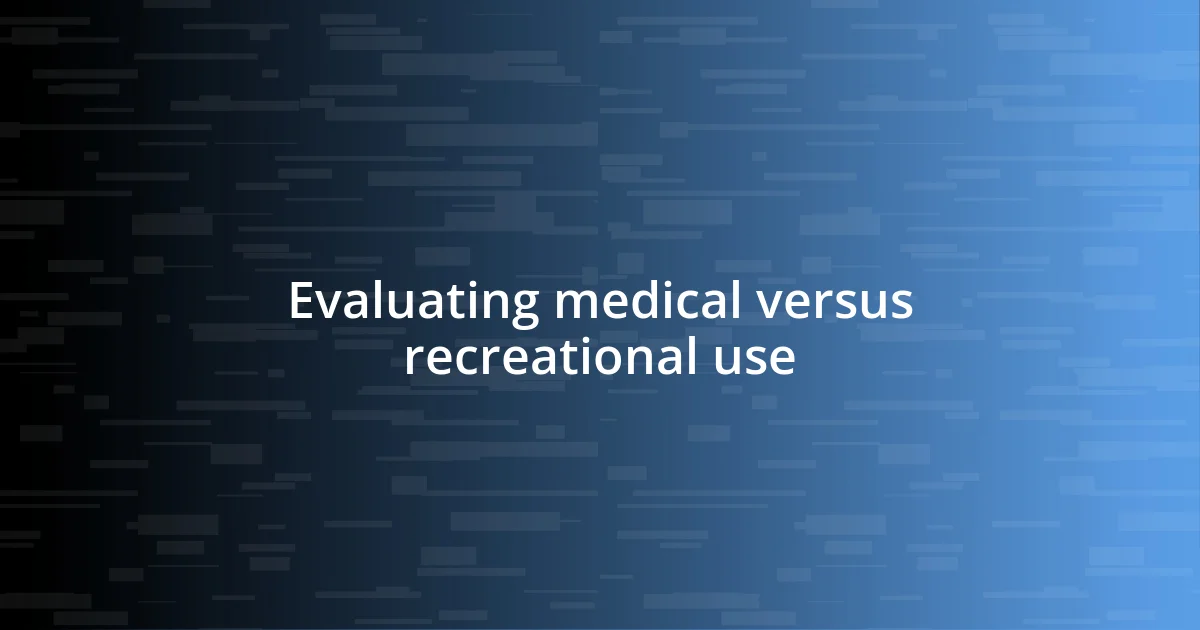
Evaluating medical versus recreational use
Evaluating the differences between medical and recreational cannabis use is crucial in understanding the broader legal landscape. Personally, I’ve seen how medical users often approach cannabis with specific intentions, like managing pain or anxiety, which brings a different level of scrutiny to their legal protections. In contrast, recreational users typically seek enjoyment or relaxation, often facing more stigma or restrictive regulations.
Here are some key factors to consider when evaluating the two types of use:
- Purpose: Medical users have a defined need, whereas recreational users engage for pleasure.
- Legislation: Medical cannabis often benefits from more robust legal frameworks and protections.
- Access: Medical patients may have easier access to a broader range of products and dosages than those using recreationally.
- Stigma: Medical use may be viewed more favorably, while recreational use can still carry social stigma.
- Cost: Medical cannabis can sometimes be less expensive due to insurance coverage options, unlike recreational products, which often come with higher taxes.
It’s clear to me that these differences reflect more than just legality; they reveal underlying societal attitudes and the personal journeys of users like myself. I remember chatting with a friend who relies on medical cannabis. Her struggle for legitimacy and access highlighted how the distinction isn’t just legal—it’s deeply personal. Understanding this can help us navigate our own cannabis experiences with greater empathy and knowledge.
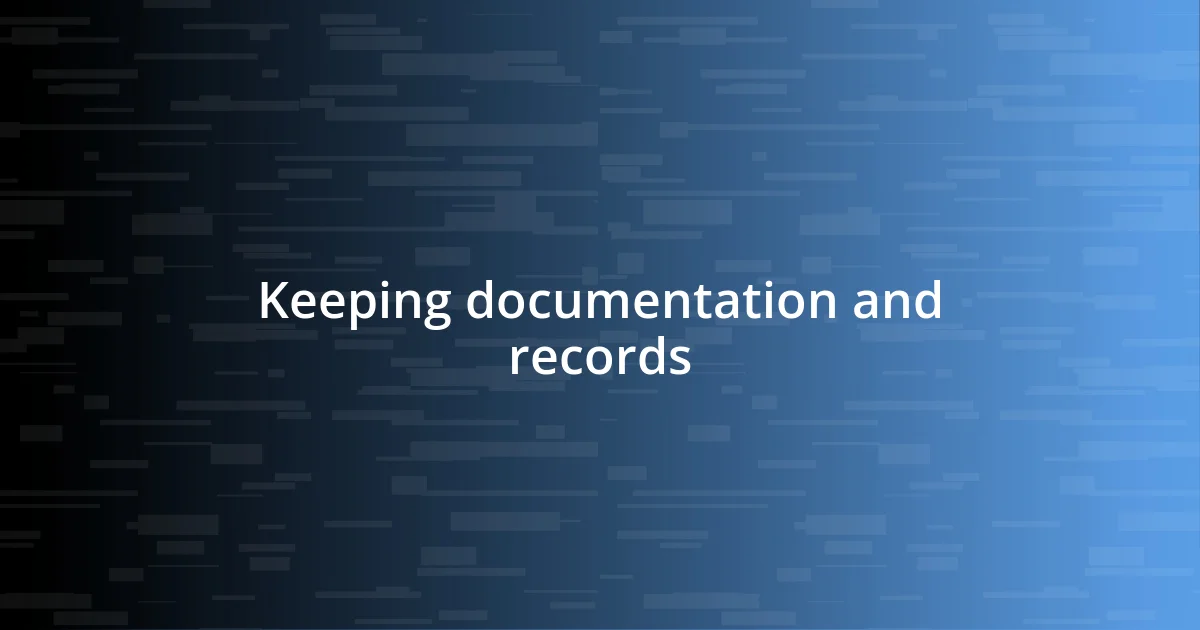
Keeping documentation and records
When it comes to keeping documentation and records, I can’t emphasize enough how crucial this practice is in the cannabis landscape. Just imagine facing a legal situation and not having relevant paperwork on hand! For me, maintaining a well-organized folder of receipts, licenses, and correspondence with local authorities helped me not only stay compliant but also provided peace of mind during uncertain moments.
I learned the hard way that losing track of my records can lead to unnecessary headaches. Once, I missed a renewal deadline for my medical cannabis card because I thought I had saved the email reminders. The stress of scrambling to regain authorization taught me to utilize digital tools for tracking important dates. Have you ever faced similar frustrations with missed deadlines? I started using calendar alerts, and it made a world of difference, keeping me on top of my responsibilities.
Documenting my cannabis purchases turned out to be really beneficial too. Not only did it help in tracking my expenses, but it also allowed me to take note of what products worked best for me. I remember being surprised at how many different strains I tried over a few months. By jotting down my experiences, I could refine my choices and feel more in control of my wellness journey. Keeping detailed records is like creating a personal roadmap through the complexities of cannabis legality, and I’ve found it invaluable in navigating that journey.
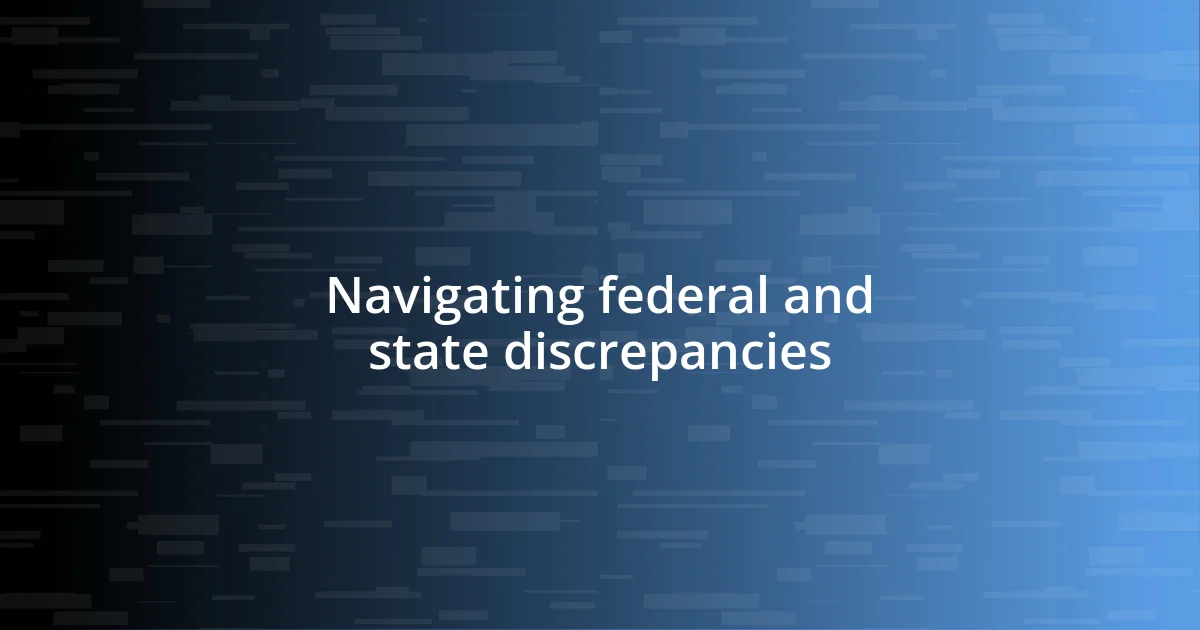
Navigating federal and state discrepancies
Navigating the discrepancies between federal and state cannabis laws has sometimes felt like walking through a maze. I recall attending a cannabis event only to discover state officials present, and I was left wondering—are they here to educate or enforce? That tension made it clear that while my state might embrace cannabis for various uses, federal prohibition loomed like a cloud overhead, leaving me anxious about potential repercussions.
In my experience, staying informed is key. The legal landscape can change rapidly, and I remember a time when competitive business proposals were seemingly dealing with cannabis as a moot point. When I sought a partnership with a local dispensary, I felt a wave of uncertainty about our legal standing. It prompted me to dig deep into both our state’s laws and federal guidelines. I’ve since learned that clear communication and legal counsel can bridge some of these gaps, but the fear of misstepping always lingers.
Moreover, I often wonder how those traveling with cannabis navigate the dangers of these discrepancies. I once went on a road trip with friends, and we were all too aware of the state lines we crossed. Those tension-filled moments kept me checking my state’s laws against federal rules. The mix of excitement and apprehension taught me that being well-prepared isn’t just about knowledge; it’s about having the confidence to face those legal gray areas head-on. Every journey through these discrepancies has contributed to my understanding, reminding me that staying educated is not just a necessity—it’s a crucial part of my cannabis experience.
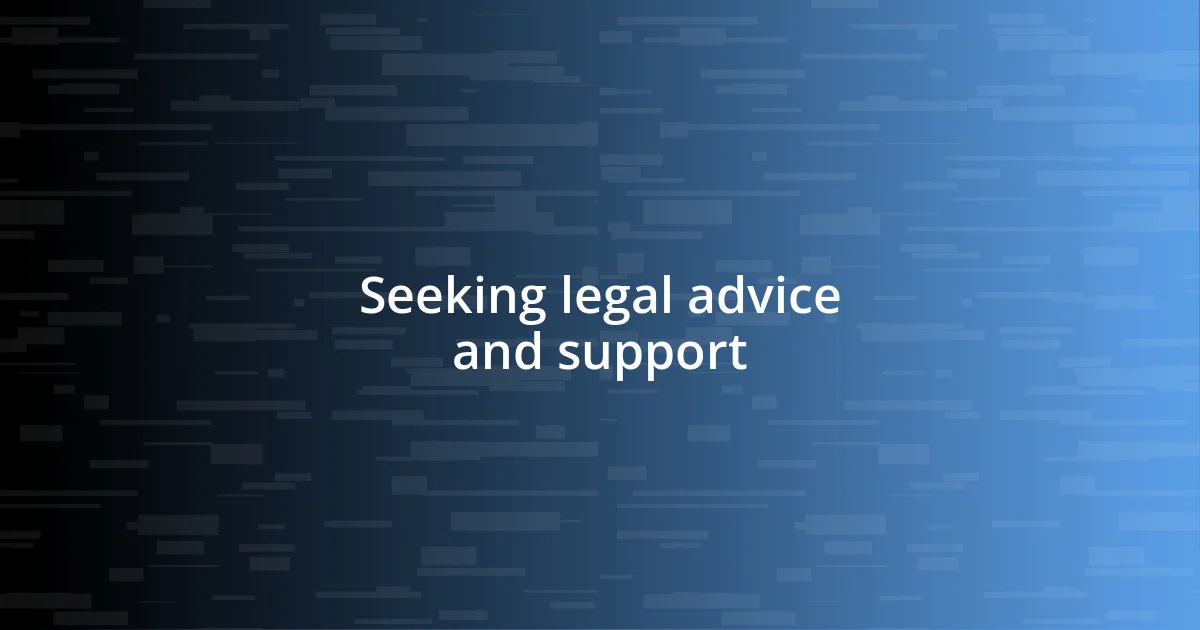
Seeking legal advice and support
Seeking legal advice became a vital step in my cannabis journey, especially when I faced uncertainties about compliance. I still remember sitting across from a legal expert who specialized in cannabis law, feeling that mix of anxiety and hope. It was a revelation to discuss how state regulations affect individual situations; those conversations opened my eyes to the nuances I had overlooked. Have you ever felt overwhelmed by the complexities of a law? I certainly did, and I found that seeking support can make all the difference.
Getting legal guidance wasn’t just about understanding the law but also about gaining peace of mind. I once encountered a situation where the legality of a product was ambiguous, and I felt lost. After reaching out to a local attorney, their insights helped clarify my options. I learned that having a professional in your corner not only eases stress but can also aid in making informed decisions. It’s comforting to know someone can navigate the intricacies with you, don’t you think?
In seeking legal advice, I found that establishing a relationship with my lawyer proved invaluable. They became more than just a resource; they were a partner in my cannabis journey. There were times when I could just pick up the phone and ask questions that weighed on my mind. I recall one late night, feeling uncertain about changes in local laws. Just a quick chat with my attorney reassured me and helped me chart the course ahead. Building this kind of support system has been essential in adapting to the ever-changing cannabis landscape.
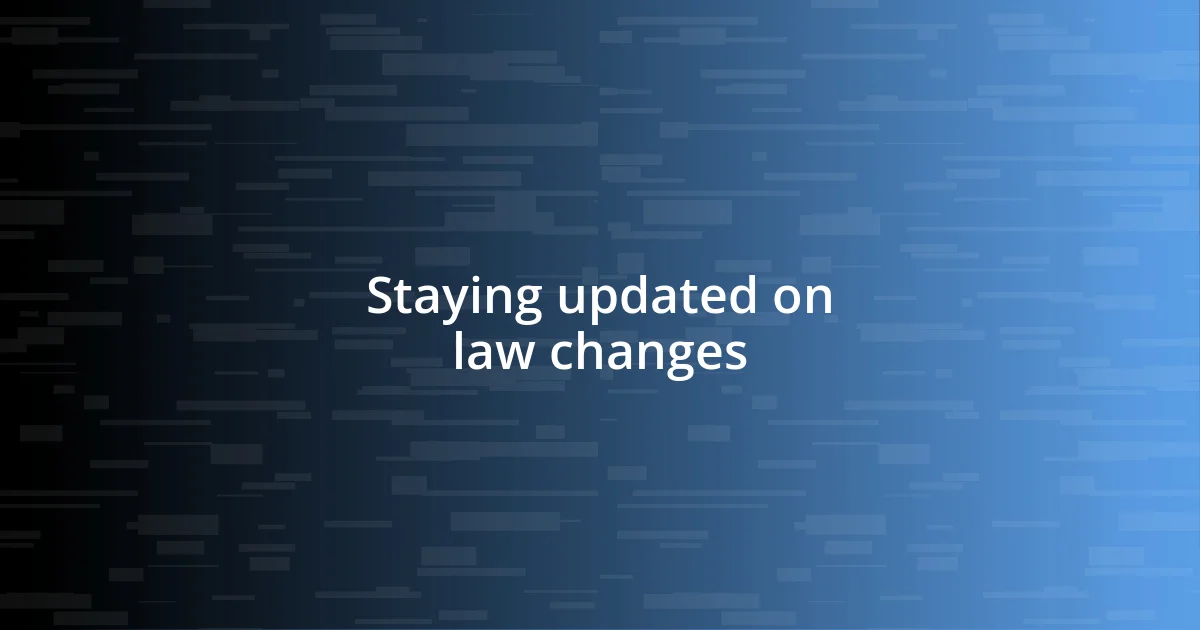
Staying updated on law changes
Staying updated on cannabis law changes can sometimes feel like a part-time job, but it’s essential for anyone involved in the scene. I remember once stumbling upon a headline about a last-minute state ruling that drastically altered the rules for recreational use. It was a rollercoaster moment—my heart raced as I realized how quickly things could shift. How often have you encountered a regulation that changed overnight? I learned to make it a habit to check reputable news sources and legal bulletins weekly.
I’ve also joined several online forums where passionate cannabis enthusiasts and legal experts share updates. There’s something comforting about being part of a community that is just as invested in staying informed. I recall a heated discussion over a new local ordinance; it sparked serious debate and clarified misconceptions I had. Have you ever felt the buzz of community insight? It fosters a sense of collective understanding and keeps you in the loop about nuances that may directly impact your experience.
In this fast-changing environment, I’ve found that subscribing to newsletters from cannabis advocacy groups is invaluable. They distill complex legal jargon into digestible updates. One evening, after a long day, I received an update that detailed upcoming changes in regulations that could enhance access to medical cannabis. That moment was uplifting; I knew it could benefit many people. Staying on top of these changes doesn’t just arm you with knowledge—it empowers you to navigate the ever-evolving landscape of cannabis legality with confidence.














